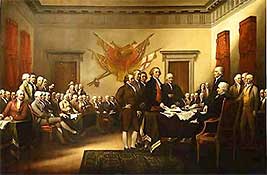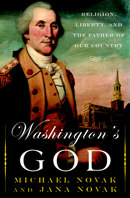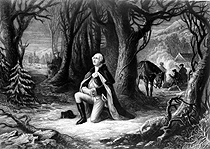Some early morning reflections in response to recent combox discussions on this blog
"America is a Plastic country. It is NOT a nation! America is a farrago. America is dysfunctional and is dying.America was built on a "revolutionary" spirit!!! America is built on self-contradicting principles and some principles that are out-right lies. It is a dead country. Aristotle says that "A state does NOT consist of individuals that are all-a-like". Well, America is not even a state. It is a place---that is it."
W. Lindsay Wheeler, combox circa June 26, 2006.
The amusing thing about this tirade against America is that, in my own pseudo-revolutionary college years, I would have gotten such a thrill out of this manner of speaking. Wheeler may be on the opposite end of the political spectrum from William S. Burroughs, but his bitter, blatant cynicism towards America is of such a visceral nature that I confess I often have difficulty distinguishing him from those on the Left.
 Now, the interesting thing is that Michael Novak -- yes, the dreaded neocon and object of vehement criticism from Wheeler, Jones, Hand and others -- once spoke himself of
Now, the interesting thing is that Michael Novak -- yes, the dreaded neocon and object of vehement criticism from Wheeler, Jones, Hand and others -- once spoke himself of
". . . the hollowness of so much of American life; the vacant eyes watching television and drinking beer; the tired eyes of the men on the commuter train; the efficient eyes of the professor and manager, the sincere eyes of the television politician. Americans . . . do not
know who they are, only what they are useful for; they are bored and apathetic because they are manipulated; they are violent because they secretly resent the lies they are forced to live. Unable to live with themselves, Americans level the earth, build and destroy, attempt to master matter and space and human history. Americans play God." ['A Theology for Radical Politics' 1969]
But, somewhere along the way, something happened to Michael Novak.
According to his memoirs ("Controversial Engagements" First Things April 1999) he became a neoconservative ("The term was invented as a sign of excommunication by the Catholic socialist (and my good friend) Michael Harrington"); to put it in the words of the Houston Catholic Worker, he joined Fr. Neuhaus and George Weigel in becoming advocates of "wage slavery" and "unbridled capitalism", preaching "a new gospel of wealth creation" in stubborn opposition to Catholic social teaching.
In any case, a little more than a decade after he penned his own tirade against Americans, Novak would come to reconsider his criticism, writing in 1982's The Spirit of Democratic Capitalism:
That this was a superficial, unfair, and ideological description of real Americans became clear to me when I looked more closely at my neighbors and companions, and less at literary conventions.
The headlines of the morning tabloid New York Post, for instance, might reveal signs of "materialism", the "emptiness," the "hollowness" of American life. The latest scandal of a movie star caught in an illicit affair, financial shadiness from a corporate executive on Wall Street; the faux-violent posturings of a rap star. But can I honestly take from this and extrapolate an indictment of Americans in general? How about just those I see on the subway? -- Or should we remember to locate blame within the individual subject?
From what I have observed, once you orient your posts in opposition to a stereotype, or rely on a sweeping generalization and indictment of the whole, it perverts the conversation in such a way that one is not actually engaging a person, or even his position, but a superficial caricature thereof.
I'm not asking for the cautious optimism of Alexis De Tocqueville (Democracy in America) or the appreciative reflections of Jacques Maritain (Reflections on America) -- disagree with Novak, Weigel, Neuhaus if you must. Point out the flaws of the Enlightenment pressupositions in the thought of our Founding Fathers, and the temptations of materialism, commercialism, and egalitarianism (and I will likely agree, up to a point). But is it possible to render your thoughts without succumbing to sweeping generalizations? to see beyond the portrayal of a "dead, plastic America," and recognize a nation of real people and individual citizens?
 I had initially responded to Wheeler's comments with the observation that "obviously, he had not gone on a cross-country trip of America." If I may elaborate, what I had in mind was something along the lines of the book, A Walk Across America by Peter Jenkins: the chronicles of a young, bitter, disillusioned college student who -- after proclaiming his desire to "abandon America" to an elder -- was challenged to discover the country he thought about leaving, and so embarked on a literal walk across the U.S.A., meeting and staying with American citizens of every color, class and stripe along the way.
I had initially responded to Wheeler's comments with the observation that "obviously, he had not gone on a cross-country trip of America." If I may elaborate, what I had in mind was something along the lines of the book, A Walk Across America by Peter Jenkins: the chronicles of a young, bitter, disillusioned college student who -- after proclaiming his desire to "abandon America" to an elder -- was challenged to discover the country he thought about leaving, and so embarked on a literal walk across the U.S.A., meeting and staying with American citizens of every color, class and stripe along the way.
Jenkins recorded his memories in 1979 -- 5 years after I was born. I was in elementary school when my father read it to my brothers and me, but the stories and the people and, most of all, the lesson of that book has remained -- and have never seem more pertinent than when I read the bitter tirades against an empty, abstract caricature of America from the ideological left (or the right).
- Jacques Maritain on "The Old Tag of 'American Materialism'" -- a section from his Reflections on America, simply too good not to be read in its entirety.
- Ten Commandments for Writing a History of America, by Paul Johnson. The American Enterprise May / June 1998. "Always remember America is about people. It is a land, of course—and what a land—but it is, above all, a people, the most varied amalgam of people of all races and cultures the world has ever seen."
- A Writer Treks Across America, by Michelle York. New York Times February 13, 2005. "Then, he was a loner, a vegetarian and a pacifist. Today, he is the head of a large family, the owner of a cattle farm and a supporter of President Bush and the war in Iraq." I suppose this should be read as a disclaimer for those considering embarking on such a journey? ;-)
* * *UPDATE! (July 6, 2006)
After some consideration and reflection over the conversations that have occured in our combox over the past week, I've decided to impose upon Mr. Wheeler an involuntary vacaton from the combox.
This blog was created to facilitate discussion of the issues which concern this particular website, namely, the interaction of the Catholic Church with the "American experiment" and the founding principles of our nation.
Witnessing the exchange between Mr. Wheeler and others, it seems that Wheeler has more than clarified his thought on this subject, making it plain that in all cases he firmly repudiates both parties involved in this debate: not only the Catholic Church, but also the philosophical foundations of the very country that he presently resides in.
Needless to say this manner of repudication already places him outside the discussion, and I wonder what we can benefit by engaging him further? -- Especially when it seems that, as a fellow commentator has noted:
You are so determined to be insulted that I don't think you're actually reading (in the sense of comprehension) anything anyone writes to you. Perhaps you should consider stepping back, taking a deep breath, and taking time to reflect a little. I haven't seen anyone here write anything calculated to call forth the stream of invective with which you have doused us. You seem to take descriptions as pejoratives, and explanations as the web equivalent of walking into a bar looking for a fight.
Wheeler has shown little interest in engaging the actual content of any post so much as commandeering the combox and hammering home his own furvent and repetitive denunciations in a barrage of post after post. (And in so doing, I suspect, driving away others who might be otherwise interested in engaging in a civil conversation -- I have seen this happen too many times, and it has been the ruin of many an email list or bulletin board).
My parting recommendation to Mr. Wheeler is that in my experience, there is no more suitable a vehicle for the presentation of his opinions than a blog -- and, thanks to the blessings of modern technology, American ingenuity and unbridled godless capitalism, he can now obtain one of these new-fangled contraptions for his very own right.
A brief summary of Mr. Wheeler's objections to America can be found here; my suggestion would be that he expound upon them on his own blog (rather than hijack a combox), and those interested in engaging him at length can do so.



 Now, the interesting thing is that Michael Novak -- yes, the dreaded neocon and object of vehement criticism from Wheeler, Jones, Hand and others -- once spoke himself of
Now, the interesting thing is that Michael Novak -- yes, the dreaded neocon and object of vehement criticism from Wheeler, Jones, Hand and others -- once spoke himself of
 I had initially responded to Wheeler's comments with the observation that
I had initially responded to Wheeler's comments with the observation that 


 How does grace penetrate nature? How can we see evidence of this? One great strength in the writings of Novak and Weigel is their willingness to look for concrete manifestations of their ideas in history. In an article on Jacques Maritain, Novak adopts the French philosopher’s view of the work of grace in history through non-Christian agents:
How does grace penetrate nature? How can we see evidence of this? One great strength in the writings of Novak and Weigel is their willingness to look for concrete manifestations of their ideas in history. In an article on Jacques Maritain, Novak adopts the French philosopher’s view of the work of grace in history through non-Christian agents:

 Jeffrey Hart is an English professor at Dartmouth College. A speechwriter for President Ronald Reagan and an editor of the National Review (the longest serving NR editor after William F. Buckley), Hart is author of
Jeffrey Hart is an English professor at Dartmouth College. A speechwriter for President Ronald Reagan and an editor of the National Review (the longest serving NR editor after William F. Buckley), Hart is author of 


 On January 3, 2006
On January 3, 2006